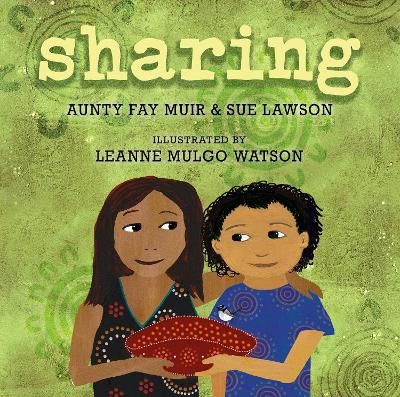
Title
Sharing
Author
Aunty Fay Muir
Secondary Authors
Sue Lawson
Illustrators
Leanne Mulgo Watson
Publisher, Date
Magabala Books, 2021
Audience
3-4yrs, 5-8yrs, Lower Primary, Primary, Upper Primary
AC Links/EYLF
EYLF1, EYLF2, EYLF3, EYLF4, EYLF5, ACHASSK013, ACHASSK01, ACHASSK016, ACHASSK017, ACSSU002, ACSSU004EYLF1, EYLF2, EYLF3, EYLF4, EYLF5, ACHASSK013, ACHASSK01, ACHASSK016, ACHASSK017, ACSSU002, ACSSU004, ACSHE013, ACAVAM106, ACAVAR109, ACPPS001, ACPPS002, ACPPS003, ACPPS004, ACPPS006, ACPPS007, ACELA1453, ACELT1582, ACELT1584, ACHASSK030, ACHASSK031 , ACHASSK032, ACHASSK033, ACSSU017, ACSSU211, ACSSU018, ACSHE021, ACSHE022, ACPPS0018, ACPPS0019, ACPPS0021, ACPPS0023, ACPPS0024, ACELA1462, ACELT1587, ACELT158, ACELT1591, ACHASSK046, ACHASSK049, ACSSU032, ACSHE034, ACSHE035, ACELT1594, ACELT1596, ACELT1599, ACHASSK062, ACHASSK063, ACHASSK066, ACHASSK069, ACSSU044, ACSHE050, ACAVAM110, ACAVAR113, ACPPS036, ACPPS037, ACPPS041, ACPPS042, ACELA1498, ACELT1602, ACELT1603, ACELT1605, ACHASSK088, ACHASSK089, ACHASSK090, ACSSU072, ACSSU073, ACSSU074, ACSSU075, ACSHE062, ACELA1502, ACELT1608, ACELT1609, ACELT1610, ACHASSK112, ACHASSK113, ACSSU043, ACSSU083, ACAVAM114, ACAVAR117, ACPPS051, ACPPS054 , ACPPS058 , ACPPS059, ACPPS060 , ACELA1518 , ACELT1613 , ACELT1614, ACHASSK140, ACSSU094, ACSHE098, ACSHE100
ISBN
9781925768749
Add to Favourites
-
Subjects
-
Annotation
-
Teaching Resources
